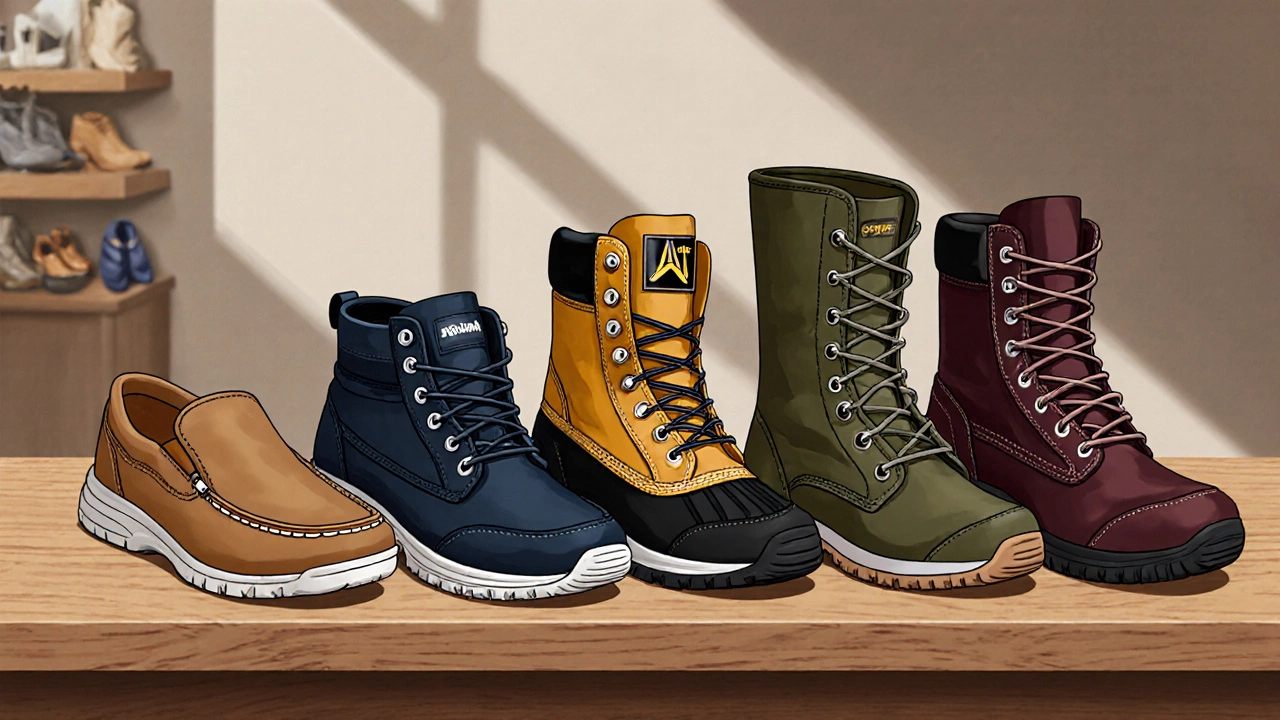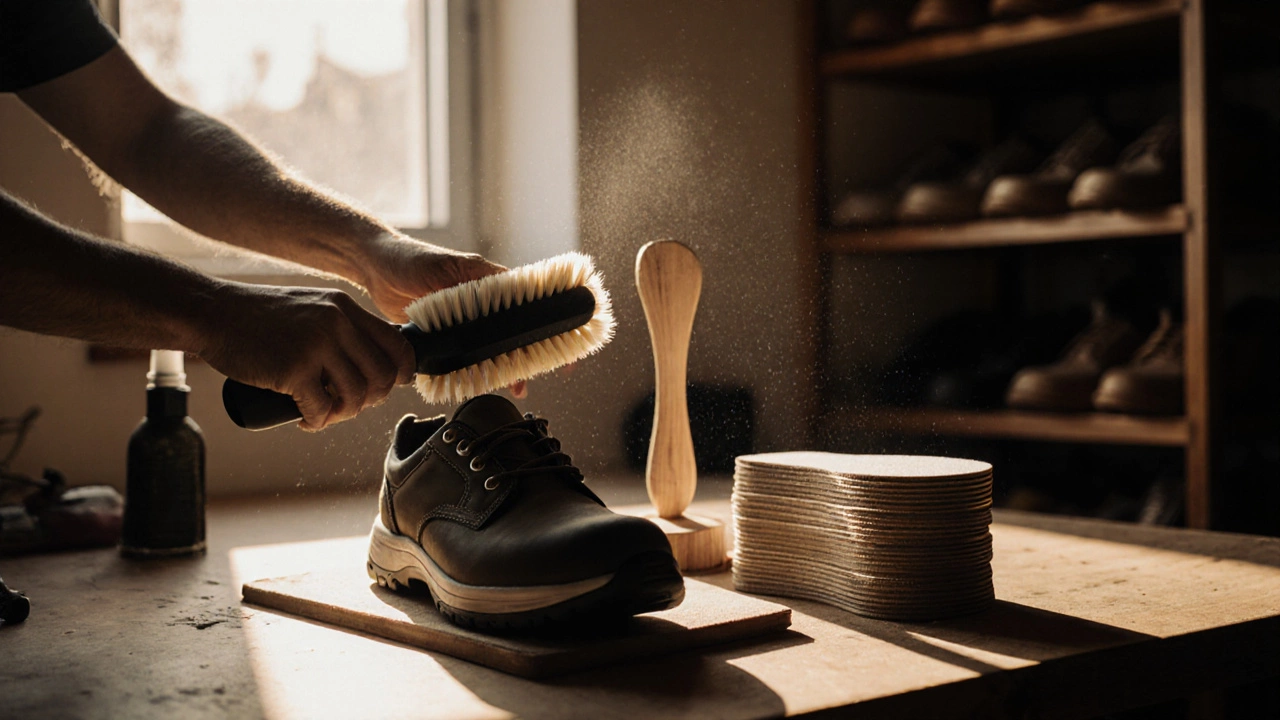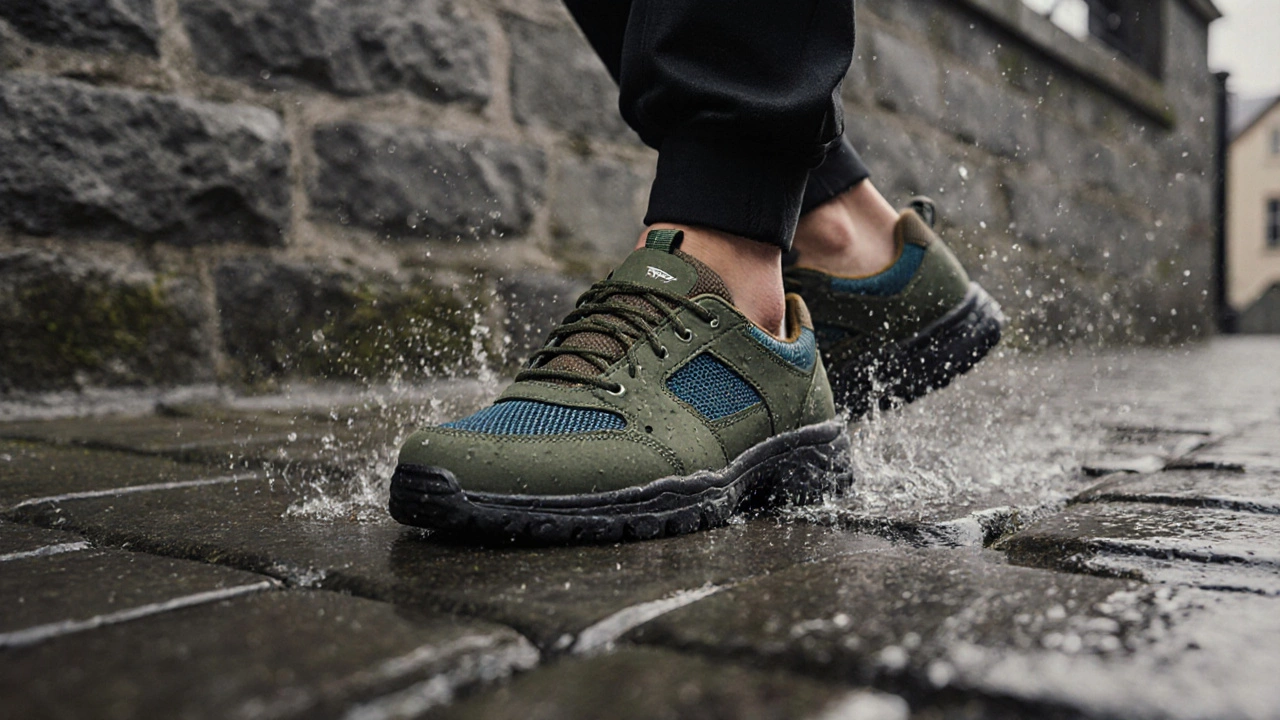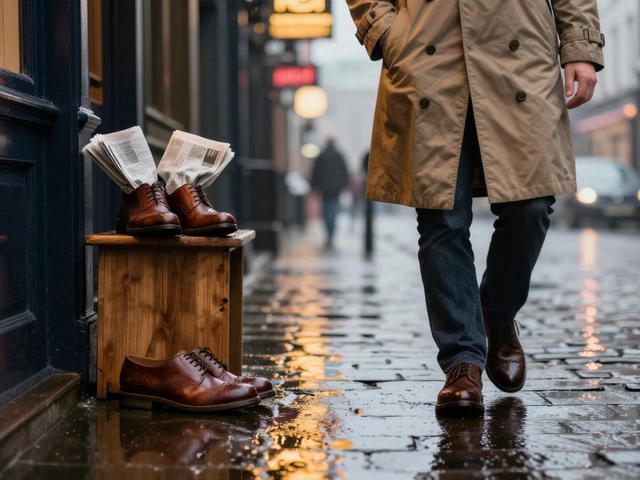Comfort Score Calculator
Calculate your ideal work shoe comfort score based on the key factors for Irish working conditions. Rate each feature from 1 (poor) to 5 (excellent) to determine how well a shoe meets your needs.
1 (Poor) 5 (Excellent)
1 (Poor) 5 (Excellent)
1 (Poor) 5 (Excellent)
1 (Poor) 5 (Excellent)
1 (Poor) 5 (Excellent)
1 (Poor) 5 (Excellent)
Finding the right pair of comfortable work shoes is a daily challenge for anyone who spends hours on their feet, especially in Ireland. Between the damp Atlantic weather, the cobbled streets of Galway, and the fast‑paced offices of Dublin, you need shoes that keep you dry, stable, and pain‑free. This guide walks you through the key comfort factors, shows the top brands available on the Irish market, and gives practical tips for fitting, buying, and caring for your work footwear.
What Makes a Work Shoe Comfortable?
Comfort isn’t just a soft insole; it’s a combination of several engineering features that work together. Below are the most important attributes for the Irish work environment.
- Cushioning technology: Look for midsoles made from EVA, PU, or proprietary foams like Ortholite. They absorb shock when you walk on uneven city pavements or concrete factory floors.
- Arch support: Irish workers often stand on hard surfaces for long periods. A built‑in arch pod or removable footbed helps distribute pressure evenly.
- Water resistance: Rain is a constant in the Irish climate. Waterproof membranes such as Gore‑Tex or proprietary polyester coatings keep your feet dry without sacrificing breathability.
- Slip resistance: The Irish Safety, Health and Welfare at Work (SHWW) regulations require a minimum 0.8 slip‑resistance rating for many workplaces. Look for textured rubber outsoles that meet this standard.
- Breathability: Even in cooler weather, sweat can cause blisters. Mesh panels or leather with micro‑perforations let moisture escape.
- Weight: Heavy boots can fatigue muscles faster. Aim for shoes under 1.2 kg (about 2.6 lb) for all‑day comfort.
Top Brands for Comfortable Work Shoes in Ireland (2025)
Irish retailers stock a mix of international giants and home‑grown specialists. The table below compares the most popular choices based on technology, price, and availability.
| Brand | Key Comfort Tech | Price Range (EUR) | Availability in Ireland | Best Use Case |
|---|---|---|---|---|
| Clarks | Ortholite footbed, Cushion Soft Sole | 80‑130 | Clarks stores in Dublin, Cork, Limerick + online via clarks.ie | Office & retail environments |
| Caterpillar | Steel toe, Slip‑Resistant rubber, Waterproof leather | 110‑180 | Boot Barn Ireland, selected DIY chains, online | Construction and heavy‑industry sites |
| ASICS | GEL cushioning, Breathable mesh | 90‑150 | Sports‑wear shops in Dublin, Galway, online | Healthcare and hospitality where walking is constant |
| Sorel | Winter‑Ready waterproof, Removable EVA footbed | 120‑190 | Sorel boutiques in Dublin, Belfast, major department stores | Outdoor work in rainy or snowy conditions |
| Shoezies | Memory‑foam insole, Goodyear‑welt construction | 70‑110 | Online only, free Irish delivery | Budget‑friendly options for start‑ups and freelancers |

How to Fit and Test Work Shoes Before You Buy
Even the most technically advanced shoe can feel wrong if it doesn’t fit your foot shape. Follow these steps the next time you try a pair in a Dublin shoe store or order a size online.
- Measure your foot length and width in the evening (feet swell throughout the day).
- Check the brand’s size chart; Irish sizing often matches UK standards, but EU sizes differ by 0.5‑1 cm.
- Walk on the store’s test mat or, if online, order a hassle‑free 30‑day return.
- Pay attention to pressure points - there should be a small gap (about a thumbnail’s width) between your longest toe and the front of the shoe.
- Flex the heel; the shoe should bend easily at the ball of the foot while the heel stays firm.
- Try them with the socks you’ll actually wear - thick wool socks are common in Irish winter workplaces.
Where to Buy Comfortable Work Shoes in Ireland
From city centre high streets to rural hardware stores, Ireland offers several reliable channels:
- Specialist retailers: Clarks (multiple locations), Brown Thomas (Dublin), and the independent store “The Shoe Room” in Galway have knowledgeable staff who can assess fit.
- DIY and work‑wear chains: Homebase, Woodies, and Screwfix stock Caterpillar and Sorel boots that meet SHWW safety standards.
- Online marketplaces: Amazon EU, eBay, and the brand‑direct sites (clarks.ie, shoezies.com) ship to all Irish postcodes with free returns.
- Local shoe repair shops: In towns like Killarney and Waterford, cobblers can customise insoles for extra arch support.
When buying online, double‑check the delivery window - heavy boots can take longer to ship to the west coast (e.g., Mayo or Donegal).

Maintenance Tips for Irish Weather
Even the toughest waterproof leather can lose its protection after a few months of rain. Keep your work shoes in top shape with these routine steps:
- Clean after each shift: Wipe off mud with a damp cloth. For deeper dirt, use a soft brush and a mild leather cleaner.
- Re‑apply waterproof spray: Once a month, spray a silicone‑based water repellent, especially on the toe caps.
- Rotate pairs: Give each pair at least 24 hours to air out, reducing odor and material fatigue.
- Replace insoles: Ortholite or memory‑foam insoles lose cushioning after 6‑12 months. Swap them out for fresh ones.
- Store properly: Use a shoe tree or stuff the toe area with newspaper to retain shape.
Frequently Asked Questions
Are waterproof work shoes worth the extra cost in Ireland?
Yes. With an average of 165 rainy days a year, a waterproof pair prevents soggy feet, blisters, and costly foot infections, especially for those who walk outdoors between jobs.
What slip‑resistance rating do I need for a retail job?
The Irish SHWW guidelines recommend a minimum coefficient of friction (COF) of 0.8 on smooth, wet floors. Look for soles marketed as “AS 2” or “SR‑1” to meet this standard.
Can I wear the same shoes for office work and construction?
Generally no. Construction sites require steel‑toe protection and higher slip‑resistance, while office settings prioritize lighter, more breathable shoes. Switching helps extend the life of each pair.
How often should I replace my work shoes?
When the midsole no longer compresses evenly or the outsole shows deep wear (typically after 300‑400 km of walking). For high‑impact jobs, replacement every 6‑9 months is common.
Do Irish retailers offer a fitting service for work shoes?
Most specialist shoe stores (e.g., Clarks, The Shoe Room) provide a free foot‑measurement and a short walk test. Larger chains may only offer basic size assistance, so ask for a staff member with “foot‑fit” experience.


